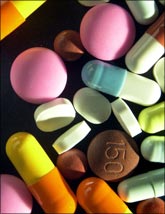 | « Back to article | Print this article |
 At a projected growth rate of 15-20 per cent per annum, by 2015 at least 200,000 more pharma graduates would be required by the Indian pharmaceutical industry which currently employs about 10 lakh (1 million) pharmacists.
At a projected growth rate of 15-20 per cent per annum, by 2015 at least 200,000 more pharma graduates would be required by the Indian pharmaceutical industry which currently employs about 10 lakh (1 million) pharmacists.
The manufacturing sector alone will create new positions for 100,000 graduates in the next five to six years, according to B Suresh, vice chancellor, JSS University and president of the Pharmacy Council of India.
On top of this, the Centre is keen to start over 50 Drug Information Centers across the country with at least two in each state apart from pharmacovigilance centers in hospitals that would be manned by pharmacologists.
The net pharmaceutical production currently in the country is around Rs 60,000 crore (Rs 600 billion), of which around Rs 36,000 crore (Rs 360 billion) is for internal consumption and the rest for exports, said Suresh.
He added that currently there are around one million pharmacists in the country registered with the Pharmacy Council and around 700,000 drug stores. India now churns out 35,000 pharma graduates every year from around 600 pharma institutes and around 400 more institutes are likely to be approved by the Council soon.
"By 2012, these institutes would roll out 60,000 graduates per year, with 12,000 post graduates," Suresh said.
According to Central government targets, the industry capacity should reach $25 billion by 2015 and according to Vision 2020 for the Pharma industry released by former President of India, APJ Abdul Kalam Azad in 2005, the industry should touch a manufacturing capacity worth $100 billion, Suresh said, adding that there is huge scope for the industry to grow.
As for the Drug Information Centers, it could be set up with state and Centre initiative in collaboration with the State Pharmacy Council and teaching institutions. Qualified pharmacologists will answer queries pertaining to drugs that callers raise.
"Even doctors can take advantage of this facility to keep them updated about new drugs," said S P Adeshara, chief coordinator of the 61st Indian Pharmaceutical Congress 2009 that will be held in Ahmedabad after 23 years starting Friday.
Patients who have questions about drugs prescribed to them can also call up these centers for help. This apart, the pharmacovigilance units planned in hospitals would ensure that fake drugs were not circulated in the market, and outdated and banned drugs not sold besides keeping a vigil on the drugs prescribed to patients in the hospital.
The centre would also receive information from the public, hospitals and others about the adverse effect of any drug. This data would be collated and used for future studies on the nature of the drug so that corrective measures could be taken to counteract toxicity.
"Both the initiatives could start in 2010, while for the pharmacovigilance units, it would also depend on the preparedness of the hospital to implement the same," Adeshara said.